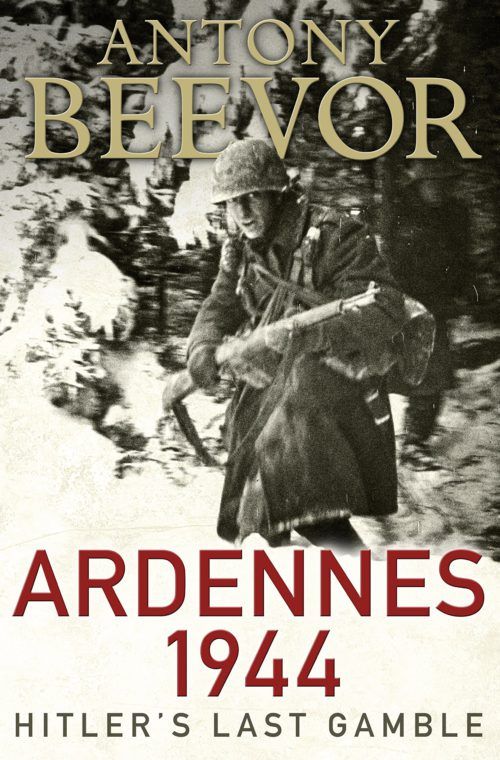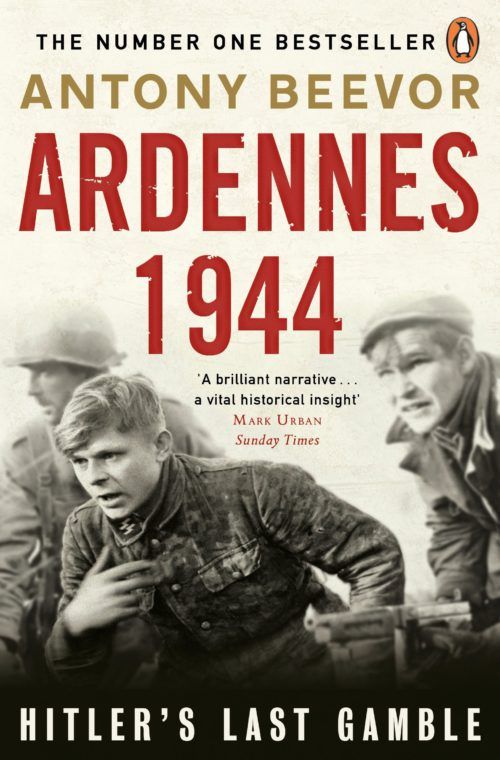 Today marks the beginning of the largest battle that American soldiers ever fought in,
as well as, writes Antony Beevor, the greatest battle of World War II in western Europe.
Today marks the beginning of the largest battle that American soldiers ever fought in,
as well as, writes Antony Beevor, the greatest battle of World War II in western Europe.
When I was a kid in Brussels, my elderly teacher was from the town of Bastogne, and had lived as a little girl through the encirclement of the town during the freezing Christmas with the troops of General "Nuts!" McAuliffe to whom the inhabitants handed out their sheets to serve as winter camouflage. Madame Cop loved my mother and often invited my parents to her home for dinner and our family did likewise. If you showed any sort of anti-Americanism in the presence of this li'l ol' Babuschka-type grand-mother, you would soon regret it.
Here is the summary of Antony Beevor's Ardennes 1944 (Hitler's Last Gamble):
On 16 December, 1944, Hitler launched his ‘last gamble’ in the snow-covered forests and gorges of the Ardennes. He believed he could split the Allies by driving all the way to Antwerp, then force the Canadians and the British out of the war. Although his generals were doubtful of success, younger officers and NCOs were desperate to believe that their homes and families could be saved from the vengeful Red Army approaching from the east. Many were exultant at the prospect of striking back.
The Ardennes offensive, with more than a million men involved, became the greatest battle of the war in western Europe. American troops, taken by surprise, found themselves fighting two panzer armies. Belgian civilians fled, justifiably afraid of German revenge. Panic spread even to Paris. While many American soldiers fled or surrendered, others held on heroically, creating breakwaters which slowed the German advance.
The harsh winter conditions and the savagery of the battle became comparable to the eastern front. And after massacres by the Waffen-SS, even American generals approved when their men shot down surrendering Germans. The Ardennes was the battle which finally broke the back of the Wehrmacht.
And here are some excerpts from Antony Beevor's Bastogne chapter in his general volume of The Second World War, which doubles with information from Greece, where fighting was taking place at the same time.
… once [the German artillery bombardment] ended, [the Americans] saw an eerie light. This false dawn was in fact 'artificial moonlight', with German searchlights behind the front lines bouncing their beams off the cloud. The German infantry in snow camouflage advancing through freezing mist and and the tall trees of the Ardennes forest looked like ghosts
… Patton [remarked that] "We should open up and let them get all the way to Paris. Then we'll saw 'em off at the base."
… The Ardennes offensive certainly proved to be [Eisenhower's] finest hour as supreme commander
… For Patton, it was an exquisite moment … "lovely weather for killing Germans"
… The 30th Division had [again] been attacked by its own aircraft, and GIs even started to refer to the Ninth [Tactical Air Command] as 'the American Luftwaffe'. This rather underlined the German army joke that "if it's British [planes], we duck; if it's American everybody ducks; and if its the Luftwaffe nobody ducks"
… Greece was another example of the Second World War merging into a latent third world war
And if you're wondering why even add the Greek part of the chapter to this post, it's because the book contains these nuggets about the (commie-lovin'?) mainstream media of the 1940s:
… The American press began to condemn British policy in strong terms. With an often naive belief that resistance fighters against the Germans must be freedom-loving, it turned a blind eye to Tito's murderous repression in Yugoslavia and also to Stalin's violence against the Polish Home Army. American journalists began to attack Churchill as an imperialist who ignored the Atlantic Charter on self-determination
… The Greek Civil War, with all its cruelties on both sides, would continue in one form or another until 1949. But Churchill's obstinate intervention at least saved the country from the fate of its northern neighbors which suffered more than four decades of Communist tyranny
… Behind the Allied lines, Belgium too underwent severe unrest
… German troops looted without compunction, but Allied troops were little better
… While the suffering of Belgian civilians was great, the majority of the Dutch fared far worse. Even those behind Allied lines were starving
… After Greece, Holland was the most comprehensively looted country in western Europe
… The Americans were scornful of the British reluctance to take casualties, while the British, like the Germans, criticized the Americans for refusing to undertake any attack without a huge expenditure of shells first. But British infantry were also unwilling to advance without heavy gunfire in support. In fact all the Allies, both in the west and in the east, had developed a "psychological dependence upon artillery and air power" the longer the war went on
Update: Thanks for the Instapundit post, Ed Driscoll, with comments from 366 readers so far:
My title is allegedely wrong, notes Instareader , who notes that "The
final US offensive in the Meuse-Argonne in September 1918 involved 1.2
million American soldiers, and is listed by some historians as the
largest U.S. battle ever", something with which Wikipedia agrees. However, the battle with the most United States military fatalities of all time was the Battle of Elsenborn Ridge (the northernmost German attacks during the Battle of the Bulge).
To those who retort that Stalingrad and "Kursk broke the back of the Wehrmacht", points out that "The Russians wouldn't have won Kursk without Oldsmobile and Bell" while I have posted this lengthier response (excerpt):
…/… in The Second World War, Antony Beevor points out that …/…
“Soviet Lend-Lease …/… in scale and scope would play a major part in the eventual Soviet victory (a fact which most Russian historians are still loath to acknowledge). Apart from high-quality steel, anti-aircraft guns, aircraft, and huge consignments of food which saved the Soviet Union from famine in the winter of 1942-3, the greatest contribution was to the mobility of the Red Army. Its dramatic advances later in the war were possible thanks only to American Jeeps and trucks.
“… [The] greatest problem [of Zhukov's armies] was not German resistance but the difficulties of their supply service, desperately trying to keep up with them on bad winter roads and without any rail line functioning. Had it not been for the American trucks provided under Lend-lease, the Red Army would never have made it to Berlin before the Americans.”


A welcome blogpost. Most people today have very little idea of just how big the Bulge battle was, or how bitter the weather, or how vicious the fighting. Outcomes that seem preordained in the sepia mists of time were very much in doubt in the midst of the struggle, and the heroism of the soldiers at the time seems diminished when the outcome is long since known.
ReplyDeleteGood comment. I like it a lot.
DeleteI visited the Bastogne battlefield in December the first year I was stationed at SHAPE. It was cold, and dark in the forests, but no snow. Maps alone can’t portray the isolation of foxholes in the Ardennes winter. Walking the ground can.
ReplyDelete(Oddly enough, about ten years later I took a DNA test to assist in my genealogy research, and the results said my bloodline said it originated in the Ardennes).
A classmate at Auburn was a German who survived the war. He said “dat damt Hitler, he ruint Chermany. He was one of two Germans taking Chemical Engineering at the time. Class of 1952.
ReplyDeleteThe Americans were scornful of the British reluctance to take casualties, while the British, like the Germans, criticized the Americans for refusing to undertake any attack without a huge expenditure of shells first
ReplyDeleteThe American way of war:
1: Be rich
2: Spend bullets, not bodies
FAR superior to "troops are cheap, equipment is expensive"
"Band of Brothers" devoted two of its ten segments to the Battle to hold Bastogne against total Germa encirclement. Other movies like Patton did a good job of showing the Herculean effort of getting his troops and tanks to relieve Bastogne before it was overrun.
ReplyDeleteThe two above mentioned segments were some of the finest war drama I have ever watched, and I re-watched "band of brothers" less than a month ago. If you get Netflix watch the entire series, but especially watch the two hours on Bastogne!
If you really want a good sense of what the battle was like, watch the 1965 film 'Battle of the Bulge' with Henry Fonda and Robert Shaw.
ReplyDeleteAnd then understand that the film was not the slightest bit like the battle in any way.
The Wehrmacht was broken by the Red Army.
ReplyDeleteMerci beaucoup pour cette énorme dose de savoir. Je visiterai certainement cet endroit beaucoup plus souvent !
ReplyDeleteMy native German grandfather brought his family to the USA in 36, enlisted in the army in 44 (told he was too old, he miraculously lost 10 years of age by walking around the block), and fought at the Bulge. When my grandparents were able to buy a home in the late 40s, he went out every morning to raise the American flag and salute it. He was very thankful of the country that took him in and gave him the opportunity to rise above abject poverty to a solid middle-class life by dint of hard work.
ReplyDeleteJe ideálny čas urobiť si nejaké plány do budúcnosti a je čas byť šťastný. Čítal som tento príspevok a ak by som mohol, chcel by som vám navrhnúť nejaké zaujímavé veci alebo tipy. Možno by ste mohli napísať ďalšie články odkazujúce na tento článok. Chcem si o tom prečítať viac vecí!
ReplyDelete